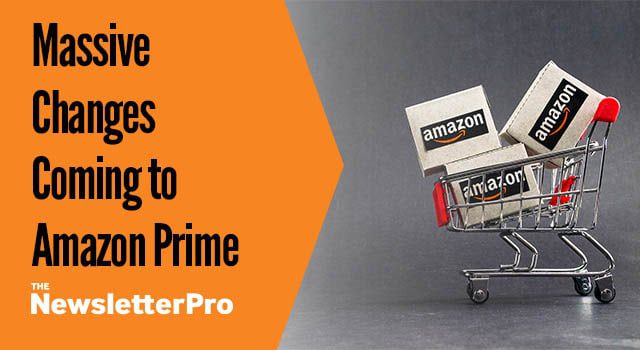Last year, Amazon made some major changes to the way they ship to their customers. Prime members were used to all sorts of perks, like Amazon Video and 2-day shipping. Over the course of several months, however, customers began to notice a very specific change: 2-day shipping had become 1-day shipping.

At a glance, this doesn’t seem like a major change. If you aren’t privy to behind-the-scenes knowledge of how the shipping industry works, you might not bat an eye. Amazon had to make some major changes to their supply chain, warehousing, and parts of their delivery infrastructure. In order to accomplish this, they had to spend nearly $3 billion.
All that for 1-day shipping.
But Amazon knows what they’re doing. They want to dominate the retail landscape, and they’ve successfully gone head-to-head with their retail competition, Walmart and Target. They’re also going after their logistics and shipping competition, namely FedEx and UPS.
When you control your own shipping service, you have more control over the price of shipping, which impacts your bottom line. With every step they take, Amazon makes it easier and easier for customers to get products delivered to their homes without waiting or even having to leave, which, given the current state of global health concerns, is a big deal.
Retailers Strike Back
 Of course, retailers are responding. While most major chains offer delivery and pickup services, they’ve lagged behind Amazon’s speedy shipping. Walmart, however, has been working on a service to directly compete with Amazon Prime called Walmart+ (not the most original name, but there you go).
Of course, retailers are responding. While most major chains offer delivery and pickup services, they’ve lagged behind Amazon’s speedy shipping. Walmart, however, has been working on a service to directly compete with Amazon Prime called Walmart+ (not the most original name, but there you go).
Still, Walmart+ has a huge mountain to climb. To no one’s surprise, Amazon is the #1 online retailer in the U.S., accounting for 40% of all online retail sales. The #2 online retailer? Walmart. But they account for only 5% of all online retail sales in the U.S. That’s a huge difference.
We can assume that as soon as Walmart+ rolls out, Amazon will do everything in their power to counter it, including offering new perks. We can only speculate what they may be, but we know they will benefit their customers. It seems that every few years, customers get used to a new standard of customer experience from the online retail giant.
In fact, Amazon’s customer experience could be hurting the customer experience of other businesses, including your own — even if you don’t ship anything. Whether you’re a lawyer, dentist, physical therapist, you name it, Amazon is influencing the way we all do business by shaping a new customer experience and new customer expectations.
Going Against A Giant
 Think about it. With over 150 million Prime members using Amazon practically every week, how long until your standard 3-8-day ground shipping starts generating complaints? How long until your 24-48-hour call-back time isn’t fast enough? How long until your customer base realizes the customer experience you provide is no longer what they expect and looks for other businesses that can match or exceed their expectations?
Think about it. With over 150 million Prime members using Amazon practically every week, how long until your standard 3-8-day ground shipping starts generating complaints? How long until your 24-48-hour call-back time isn’t fast enough? How long until your customer base realizes the customer experience you provide is no longer what they expect and looks for other businesses that can match or exceed their expectations?
People have long been adjusting to Amazon’s customer experience. A lot of people will make decisions on your business’s shipping price and speed with Amazon in mind. If you have a product listed for $49.99 with $5 flat-rate shipping but Amazon has a similar product for $59.99 with free 2-day shipping, which one are they going to pick?
You can also think about Blockbuster vs. Netflix. Can you imagine going back to $3.99-per-day rentals and $3.99 late fees? Of course not! We expect better today. Amazon is training customers on how the customer experience should be. If your company falls too far from the giant’s standards, then the customer will leave you for a competitor that can meet their expectations.
Businesses must adapt. We’ve already seen what happens when they don’t. Blockbuster thought Reed Hastings, the founder and CEO of Netflix, wouldn’t survive more than a few years at most. Now, Blockbuster is out of business with only a single location remaining in Bend, Oregon.
We All Must Adapt
 How do you adapt and improve your company’s customer experience? Start with this: What or who are people complaining about? Where there’s smoke, there is almost always fire. Follow that smoke, and you’ll have your starting point.
How do you adapt and improve your company’s customer experience? Start with this: What or who are people complaining about? Where there’s smoke, there is almost always fire. Follow that smoke, and you’ll have your starting point.
At the same time, think about minor improvements you can start making right now. What could you do faster or better? How could you improve your phone skills and customer service training? What about your communication strategy? Are you still only calling, mailing, or emailing customers when you want them to pay a bill or buy more of your products or services?
These are things any business can improve. As many businesses fight to keep customers, your customer experience needs to be everything. Amazon’s disruption of the customer experience aside, the world is a pretty chaotic place right now, and the last thing you want to do is be in a place where your customers can easily look elsewhere. Be there for your customers in any way you can and be ready to deliver a wow.






